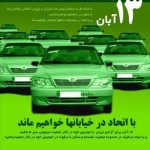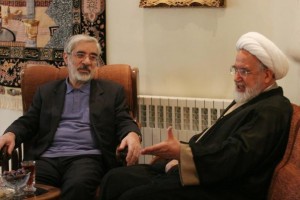Monday
Oct122009
The Latest from Iran (12 October): Green Shoots?
 Monday, October 12, 2009 at 20:01
Monday, October 12, 2009 at 20:01
NEW Iran: The Politics of the Death Sentences
NEW Iran: English Text of Mousavi-Karroubi Meeting (10 October)
Iran: The Washington-Tehran Deal on Enriched Uranium?
Iran: So Who Controls the Islamic Republic?
The Latest from Iran (11 October): The Mousavi-Karroubi Meeting
Receive our latest updates by email or RSS SUBSCRIBE TO OUR FEED
Buy Us A Cup of Coffee? Help Enduring America Expand Its Coverage and Analysis
 1930 GMT: The reformist Assembly of Combatant Clergymen, paralleling the statements of Mohammad Khatami, have written an open letter to the head of Iran's judiciary, Sadegh Larijani, warning about the consequences of the current lawlessness and stressing that the judiciary should be held accountable for crimes, violation of law, and injustices. Among these violations are detentions in solitary confinement and uncertainties about charges:
1930 GMT: The reformist Assembly of Combatant Clergymen, paralleling the statements of Mohammad Khatami, have written an open letter to the head of Iran's judiciary, Sadegh Larijani, warning about the consequences of the current lawlessness and stressing that the judiciary should be held accountable for crimes, violation of law, and injustices. Among these violations are detentions in solitary confinement and uncertainties about charges:
1910 GMT: A Very Gentle Day. Gentle by post-election standards, with the big domestic news Parliament's approval of Government cuts in food and gasoline/petrol subsidies. Reuters is only now catching up with Saturday's Karroubi-Mousavi meeting, loosely translating Mousavi as claiming, "It seems some people are trying to take us back to the Inquisition era."
1340 GMT: Posturing. After the flurry of political movement over the weekend, relatively quiet today. Mahmoud Ahmadinejad is making an appearance in Shiraz, hoping that he doesn't face too many demonstrators. Mohammad Khatami is celebrating his 66th birthday with friends.
Meanwhile, the Iranian Government continues the ritual tough-talk two-step with its US partner, covering up the private movement towards accommodation. Responding to Hillary Clinton's finger-shaking that "the world will not wait indefinitely" for Iranian movement on the nuclear issue, the spokesman for Iran's Foreign Ministry blustered on Monday, "So far, western powers have achieved nothing by using the language of threats and sanctions against Iran. The West, itself, knows that this language is useless. We have always announced that we advocate negotiations."
0905 GMT: We've posted a special analysis of the politics surrounding the four death sentences handed out by the regime in recent days. And we've updated our feature on "Who Controls Iran?".
0900 GMT: A new poster (left) for the 4 November demonstrations is circulating. It repeats the slogans of previous flyers and adds, "United, we will be on the streets.
Join our million-strong green crowd on 13 Aban [4 November] in support of freedom in Iran. Stay in your car in silence in the areas where people are sitting in."
0720 GMT: Iranian state media is trying to keep President Ahmadinejad firmly in the international arena rather than within internal difficulties. The President's latest statement was the reassurance that Iran, not "the West", was setting the agenda for the next round of talks on Tehran's nuclear programme:
Meanwhile the Iranian military is putting out its own tough reassurances, with a Brigadier General asserting, “Updating the defense systems is moving on an excellent progressive trend at present and (Iran’s systems) can compete with hi-tech systems of the world. Now we are in our best conditions of defensive preparedness."
0600 GMT: Are we seeing an opposition revival? Consider that in the last 48 hours:
*Mohammad Khatami has made a high-profile appearance in Yazd Province and issued one of the strongest criticisms of the Government to date: “Be sure that people will never back down."
*Mehdi Karroubi, in a letter sent in his son's name, used the call for fairness from Iranian state broadcasting to attack the Iran judiciary's handling of his claims of detainee abuses;
*Karroubi has also re-established his web presence with the re-launch of Tagheer;
*Mir Hossein Mousavi, after seeing senior clerics on Thursday about his "social network", had a lengthy meeting on Saturday with Karroubi. In the summary of the meeting, both in Farsi and in English, their emphasis is on a renewal of pressure against the Government over electoral fraud, "legal" injustices, and abuses.
Add to this the re-appearance of Mousavi chief advisor Alireza Beheshti after the attempt to silence him through detention. Yesterday he issued a sharp response to Ahmad Khamati's Friday Prayer, deriding the cleric's claims of a US-sponsored "velvet revolution" (given that the Iranian Government had just sat across from US delegates at the Geneva talks) and calling for "rights" and "respect" for all Iranians.
NEW Iran: English Text of Mousavi-Karroubi Meeting (10 October)
Iran: The Washington-Tehran Deal on Enriched Uranium?
Iran: So Who Controls the Islamic Republic?
The Latest from Iran (11 October): The Mousavi-Karroubi Meeting
Receive our latest updates by email or RSS SUBSCRIBE TO OUR FEED
Buy Us A Cup of Coffee? Help Enduring America Expand Its Coverage and Analysis
 1930 GMT: The reformist Assembly of Combatant Clergymen, paralleling the statements of Mohammad Khatami, have written an open letter to the head of Iran's judiciary, Sadegh Larijani, warning about the consequences of the current lawlessness and stressing that the judiciary should be held accountable for crimes, violation of law, and injustices. Among these violations are detentions in solitary confinement and uncertainties about charges:
1930 GMT: The reformist Assembly of Combatant Clergymen, paralleling the statements of Mohammad Khatami, have written an open letter to the head of Iran's judiciary, Sadegh Larijani, warning about the consequences of the current lawlessness and stressing that the judiciary should be held accountable for crimes, violation of law, and injustices. Among these violations are detentions in solitary confinement and uncertainties about charges:Our fear and concern is because of the reduction or even destruction of the peoples trust and faith in the judiciary system. How can it be that, with a simple gesture, a newspaper is closed down and thus the artery of information of a party or group is blocked instantly; however, hundreds of newspapers and [Government] media with different kinds of accusations and convictions in their evidence become richer in their unbounded cheek and still the judiciary system is unable to dispense justice and only casts some general conclusions about the reproach of lies?
1910 GMT: A Very Gentle Day. Gentle by post-election standards, with the big domestic news Parliament's approval of Government cuts in food and gasoline/petrol subsidies. Reuters is only now catching up with Saturday's Karroubi-Mousavi meeting, loosely translating Mousavi as claiming, "It seems some people are trying to take us back to the Inquisition era."
1340 GMT: Posturing. After the flurry of political movement over the weekend, relatively quiet today. Mahmoud Ahmadinejad is making an appearance in Shiraz, hoping that he doesn't face too many demonstrators. Mohammad Khatami is celebrating his 66th birthday with friends.
Meanwhile, the Iranian Government continues the ritual tough-talk two-step with its US partner, covering up the private movement towards accommodation. Responding to Hillary Clinton's finger-shaking that "the world will not wait indefinitely" for Iranian movement on the nuclear issue, the spokesman for Iran's Foreign Ministry blustered on Monday, "So far, western powers have achieved nothing by using the language of threats and sanctions against Iran. The West, itself, knows that this language is useless. We have always announced that we advocate negotiations."
0905 GMT: We've posted a special analysis of the politics surrounding the four death sentences handed out by the regime in recent days. And we've updated our feature on "Who Controls Iran?".
0900 GMT: A new poster (left) for the 4 November demonstrations is circulating. It repeats the slogans of previous flyers and adds, "United, we will be on the streets.
Join our million-strong green crowd on 13 Aban [4 November] in support of freedom in Iran. Stay in your car in silence in the areas where people are sitting in."
0720 GMT: Iranian state media is trying to keep President Ahmadinejad firmly in the international arena rather than within internal difficulties. The President's latest statement was the reassurance that Iran, not "the West", was setting the agenda for the next round of talks on Tehran's nuclear programme:
We have already agreed to discuss Iran's latest package of proposals. I don't think there will be any problems in the next round of talks but if someone wants to cause problems, they will fail. And if they succeed to do so, they will harm themselves.
Meanwhile the Iranian military is putting out its own tough reassurances, with a Brigadier General asserting, “Updating the defense systems is moving on an excellent progressive trend at present and (Iran’s systems) can compete with hi-tech systems of the world. Now we are in our best conditions of defensive preparedness."
0600 GMT: Are we seeing an opposition revival? Consider that in the last 48 hours:
*Mohammad Khatami has made a high-profile appearance in Yazd Province and issued one of the strongest criticisms of the Government to date: “Be sure that people will never back down."
*Mehdi Karroubi, in a letter sent in his son's name, used the call for fairness from Iranian state broadcasting to attack the Iran judiciary's handling of his claims of detainee abuses;
*Karroubi has also re-established his web presence with the re-launch of Tagheer;
*Mir Hossein Mousavi, after seeing senior clerics on Thursday about his "social network", had a lengthy meeting on Saturday with Karroubi. In the summary of the meeting, both in Farsi and in English, their emphasis is on a renewal of pressure against the Government over electoral fraud, "legal" injustices, and abuses.
Add to this the re-appearance of Mousavi chief advisor Alireza Beheshti after the attempt to silence him through detention. Yesterday he issued a sharp response to Ahmad Khamati's Friday Prayer, deriding the cleric's claims of a US-sponsored "velvet revolution" (given that the Iranian Government had just sat across from US delegates at the Geneva talks) and calling for "rights" and "respect" for all Iranians.

 1900 GMT: Former President Khatami has followed up his speech in Yazd Province (1445 GMT) with a strong challenge to the regime
1900 GMT: Former President Khatami has followed up his speech in Yazd Province (1445 GMT) with a strong challenge to the regime  1920 GMT: A Bit of Official Hesitation?
1920 GMT: A Bit of Official Hesitation?